
Jan Howard was an American author, as well as a country music singer and songwriter. As a singer, she placed 30 singles on the Billboard country songs chart, was a Grand Ole Opry member and was nominated for several major awards. As a writer, she wrote poems and published an autobiography. She was married to country songwriter Harlan Howard.
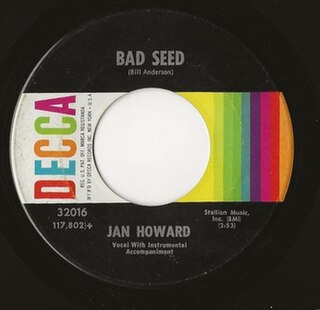
"Bad Seed" is a song written by Bill Anderson that was originally recorded by American country artist Jan Howard. Released as a single by Decca Records, it was the second top ten song on the US country chart in Howard's career. It was given reviews by Billboard, Cash Box and Wide Open Country.
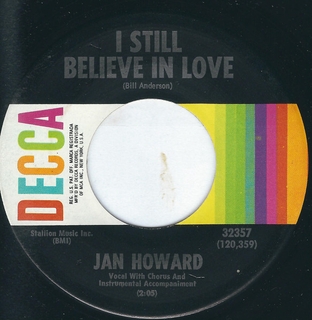
"I Still Believe in Love" is a song written by Bill Anderson that was originally recorded by American country artist Jan Howard. Released as a single by Decca Records, it made the top 40 on the US country chart and the top ten on the Canadian country chart. It was given reviews from both Billboard and Cash Box magazines.

"My Son" is a song written and recorded by American country music singer Jan Howard. It is among several songs recorded by country artists during this period that related to the Vietnam War. The song is based on a letter Howard wrote to her son, Jimmy, who was drafted into the war. After writing the letter, she was inspired by family and friends to put it to music. Recording the song in a single take, it was released as a single in 1968.

"We Had All the Good Things Going" is a song written by Mervin Shiner and Jerry Monday that was originally recorded by American country artist Jan Howard. Released as a single, it made the top 20 of the US country songs chart in 1969. It later appeared on her 1970 studio album Rock Me Back to Little Rock. The song received reviews from Billboard and Cash Box magazines.

Jan Howard Sings Evil on Your Mind is a studio album by American country artist Jan Howard. It was released in July 1966 by Decca Records and was her second studio album. The project consisted of 12 tracks featuring both uptempo and ballad material. Its title track was a top five US country song in 1966 and was one of four singles on the album. Another was the charting 1964 song "What Makes a Man Wander?". The album itself made the US country survey following its release and received critical reception from Cash Box magazine.

Bad Seed is a studio album by American country music artist Jan Howard. It was released in November 1966 via Decca Records and featured 12 tracks. The third studio album of her recording career, Bad Seed was named for its title track, which reached the top ten of the country charts in 1966. The disc was met with a favorable review from Cashbox following its release.
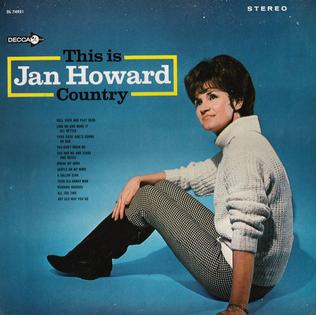
This Is Jan Howard Country is a studio album by American country artist Jan Howard. It was released in November 1967 by Decca Records and contained a total of 12 tracks. The album was the fourth released in Howard's career, featuring both uptempo tunes and ballad songs. Along with cover tracks were also new recordings. This included two single releases that made the US country top 40: "Any Old Way You Do" and "Roll Over and Play Dead". The album itself made the US country albums top ten list. It received positive reviews from both Billboard and Cash Box magazines.

Count Your Blessings, Woman is a studio album by American country music artist Jan Howard. It was released in June 1968 via Decca Records and contained 11 tracks. Many of the album's tracks were cover tunes with the exception of the title track. Released as a single, the title track was a top 20 US country song and a top ten Canadian country song. The album itself made the top 30 of the US country survey. Howard's vocal performance was praised in reviews by Billboard and Cash Box magazines.
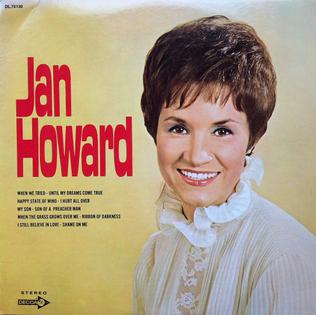
Jan Howard is a studio album by American country artist Jan Howard. It was released by Decca Records in June 1969 and contained ten tracks. The project contained a series of cover tunes, along with new songs. Among the new recordings were three singles: "I Still Believe in Love", "My Son" and "When We Tried". "My Son" was a letter Howard put to music written to her son who was killed in the Vietnam War. The album was given positive reception by Cash Box and Record World magazines. The album made the US country albums and its three singles reached positions on the North American country songs charts.
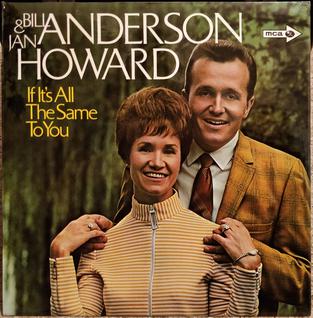
If It's All the Same to You is a studio album by American country music artists Bill Anderson and Jan Howard. The album was released on Decca Records in March 1970 and was produced by Owen Bradley. It was the pair's second collaborative album after several years of performing together on tour and on television. The album's title track became a major hit on the Billboard country chart, reaching the top 10. Additionally, the album itself would reach peak positions on the Billboard country albums chart.

Rock Me Back to Little Rock is a studio album by American country artist Jan Howard. It was released by Decca Records in June 1970 and was her tenth studio album. The project contained 11 tracks with a mixture of original tunes and cover songs. Among its tracks were two single releases: "We Had All the Good Things Going" and the title track. Both made appearances on the US country songs chart between 1969 and 1970. The album itself also made the US country chart. Both Billboard and Cash Box magazines reviewed the album following its release.
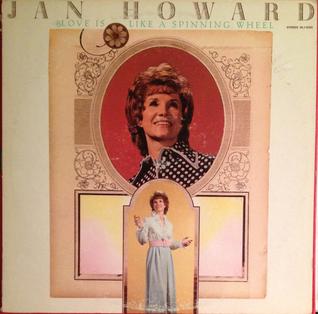
Love Is Like a Spinning Wheel is a studio album by American country artist Jan Howard. It was released by Decca Records in March 1972 and was her twelfth studio album. The project contained 11 tracks, which were a mixture of new songs and cover tunes. Among its tracks were two singles: "Let Him Have It" and the title track. The latter was a top 40 US country song and a top 20 Canadian country song. The album itself made the top 40 of the US country albums chart. The project was given reviews from Billboard and Cash Box magazines.
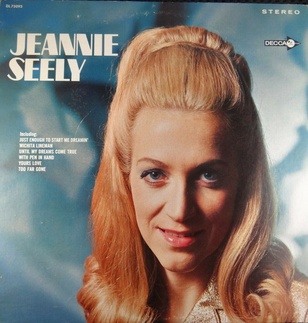
Jeannie Seely is an eponymous studio album by American country artist Jeannie Seely. It was released by Decca Records in April 1969 and was her fifth studio album. The 11-track collection featured songs written by Hank Cochran and others. Many of the songs were cover tunes, with some exceptions such as "Just Enough to Start Me Dreamin'". The latter was the album's only single and made an appearance on the US country chart in 1969. The eponymous release was Seely's first for the Decca label and received reviews from Billboard, Cash Box and Record World magazines.
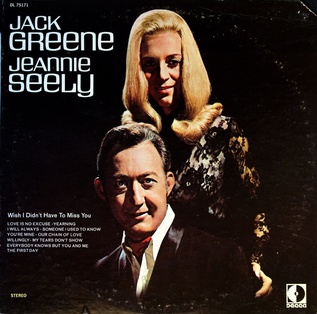
Jack Greene, Jeannie Seely is a studio album by American country music artists Jack Greene and Jeannie Seely. It was released by Decca Records in January 1970 and contained 11 tracks of mostly cover tunes. Although already both having two separate successful country recording careers, Greene and Seely teamed up to record an album of duets following the success of their single "Wish I Didn't Have to Miss You", which is also included. The LP received positive reviews from Billboard, Cash Box and Record World magazines.
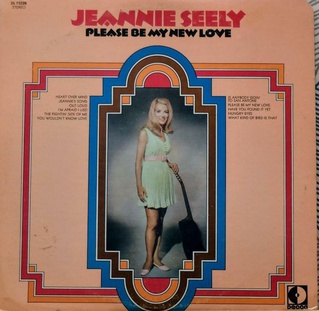
Please Be My New Love is a studio album by American country artist Jeannie Seely. It was released by Decca Records in July 1970 and was the seventh studio album in her career. The record consisted of 11 tracks, including a medley of cover tunes called "Jeannie's Medley". The latter tune and the title track were both released as singles originally. Please Be My New Love was given positive reviews by Billboard and Cash Box magazines.

My Life/But You Know I Love You is a studio album by American country singer-songwriter Bill Anderson. It was released in June 1969 on Decca Records and was produced by Owen Bradley. It was Anderson's eleventh studio album to be issued during his musical career. The album's title combines the names of its two singles. Both singles became major hits on the Billboard country chart.
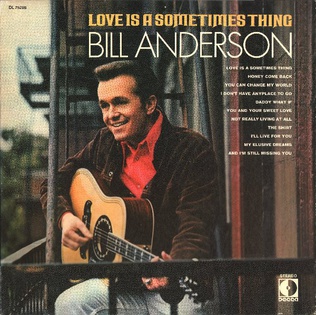
Love Is a Sometimes Thing is a studio album by American country singer-songwriter Bill Anderson. It was released in June 1970 on Decca Records and was produced by Owen Bradley. It was Anderson's fourteenth studio album since signing with the Decca label in 1958. Its only single, the title track, would become a major hit on the Billboard country chart in 1970. The album itself would also reach peak positions on the country albums chart following its release.
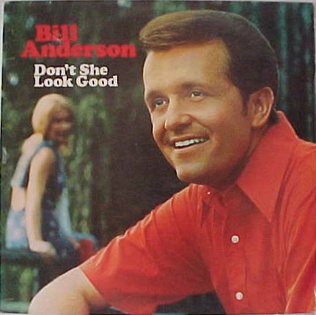
Don't She Look Good is a studio album by American country singer-songwriter Bill Anderson. It was released in November 1972 on Decca Records and was produced by Owen Bradley. The album was Anderson's twentieth studio recording to be issued. It was also his fourth studio album released in 1972. Two additional projects were collaborations with Jan Howard earlier in the year. The album's only single was the title track, which became a major hit on the country charts.
"Rock Me Back to Little Rock" is a song written by Lola Jean Dillon that was originally recorded by American country artist Jan Howard. Released as a single by Decca Records, it reached the top 40 of the US country songs chart in 1970. It was later included on her studio album of the same name. The song received a positive response from Cash Box magazine following its release.



















